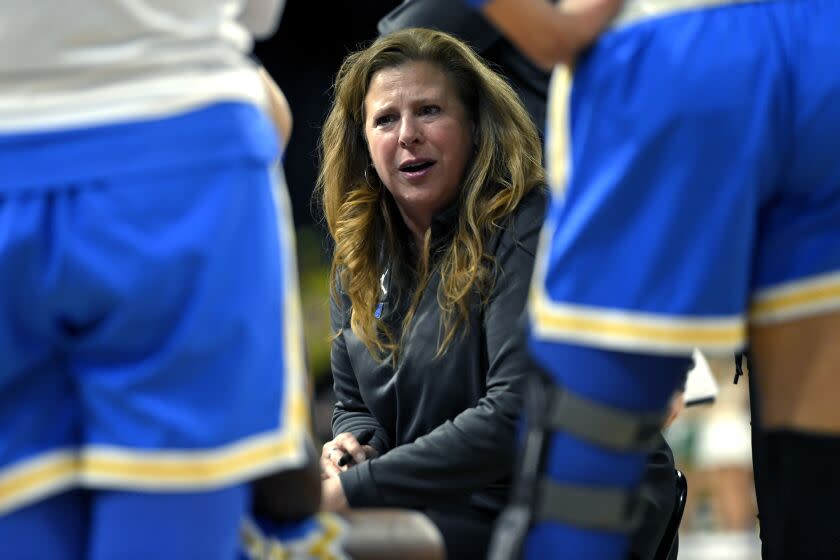Cori Close and Tara VanDerveer say Title IX inequities persist and must be challenged

Cori Close and Tara VanDerveer have a clear view of Riverside City College despite not having set foot on campus. The highly decorated Division I women's basketball coaches are keenly aware of Riverside coach Alicia Berber’s legal and administrative fight against gender inequity.
They've been career-long warriors on the front lines of the fight to enforce Title IX, the 50-year-old federal law that prohibits discrimination based on sex in education programs and activities — including athletics.
Close, 51, in her 12th season as coach of No. 8-ranked UCLA, is president of the Women’s Basketball Coaches Assn. and is active in lobbying Congress to increase funding for and enforcement of Title IX.
VanDerveer, 69, has coached No. 2-ranked Stanford to three NCAA titles in 36 years and in 44 years at Division I has more victories than any other women’s coach in history. When she attended high school pre-Title IX, school-sponsored girls’ basketball teams didn’t exist.
Both coaches said they no longer experience the bullying and inequities that Berber alleges in her lawsuit. As elite Pac-12 Conference universities, UCLA and Stanford enjoy resources, facilities and administrative support far beyond the reach of junior colleges.
Still, those limitations shouldn't excuse the bullying and intimidation Berber says she has experienced.
“The tone is set by the administration,” VanDerveer said. “Does the school value gender equity? Its actions provide the answer.”
Close is appreciative of UCLA’s commitment to adhering to Title IX. Yet as a national voice for women’s sports, she recognizes that most women in sports aren’t treated as well.
“I try to live in this healthy tension of being really thankful for how far we’ve come while remaining a relentless fighter to move the needle,” Close said. “I don’t care at what level, we still have some old-school mindsets about the difference between men and women, and opportunities."
That Berber has the likes of Cheryl Miller and Ann Meyers Drysdale as vocal supporters pleases Close.
“I’m wildly grateful myself because we are walking on a trail that others blazed,” Close said. “The great news is that women’s sports is not a charity case anymore. TV ratings are up, ticket sales are up, more and more corporations want to invest in women in sport.”
Maybe that message hasn’t trickled down to some junior colleges, where resources are scarce and attendance spotty.
“That’s where I love that we have each others' backs,” Close said. “It’s really hard, if I’m being candid, when you sort of have to fall on the sword. I look at people that have really fought for it, and even if they’ve won, they lost their jobs and no one wants to hire them again.
“So, it’s a vicious cycle. I don’t want to be known as a complaining feminist. I want to be known as a grateful fighter to move women’s issues forward, but in a balanced fashion. There’s a mistaken impression that when we fight to increase opportunities we are trying to change the slices of the pie. No, we are trying to expand the pie.”
For VanDerveer, learning of Berber's plight — and fight — had her thinking back to the advent of Title IX in 1972. She shook her head and sighed with the realization that allegations such as Berber's continue.
"Title IX should be enforced, it’s a law, it’s very disappointing when it isn't," VanDerveer said. "You’d hope school administrators would say, 'We value women’s sports.' Don’t these men have daughters, wives, mothers, grandmothers? Their actions send a message that they don’t value women and don’t respect women."
This story originally appeared in Los Angeles Times.

